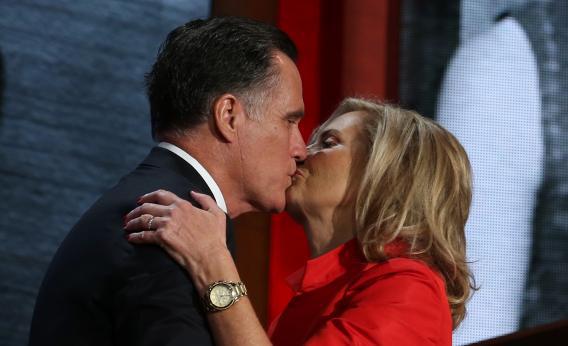In her Republican convention speech last night, Ann Romney said she had come to talk about love. As soon as she finished, New Jersey Governor Chris Christie set up a choice between love and respect—and chose respect. Over love. The apparent contradiction gave birth to many tweets, and these MoJo and BuzzFeed posts, arguing that running the two speeches back to back was a mishap. But I wonder if that’s wrong, politics-wise.
Ann Romney got to be soft and womanly and Christie got to be tough and manly. Doesn’t that represent the skillful dual appeal conservatives make to voters, a la psychologist Jonathan Haidt’s research? He argues that there are six foundations for morality, on a spectrum from caring and fairness to authority and sanctity: “Liberals jack up care, followed by fairness and liberty. They rarely value loyalty and authority. Conservatives dial up all six.” Cue Ann and Chris.
I am less sold on Ann’s eruption of love for women (“I love women!”) and her painstaking efforts to make it sound like she knows what it feels like to be pinched by the rising price of gas or groceries. The Romneys just have no claim to ordinariness. They are standouts in every way—their money, their Mormonism, their son after smiling son, their horses and their car elevators. I’m with Ross Douthat here: It’s much more convincing to sell Mitt Romney as the privileged WASP savior of the rest of us.
The economy is in bad shape, Obama is vulnerable. Why not keep going for the tiny slice of the undecided with the most credible pitch: Mitt Romney has what it takes to rescue us precisely because he is so distinctly blessed. Ann’s best line made her husband sound like Superman: “No one will move heaven and earth like Mitt Romney to make this country a better place to live!” (A note of dissent from all the praise for another line: “Mitt does not like to talk about how he has helped others because he sees it as a privilege, not a political talking point.” Really? Isn’t the reason Mitt doesn’t talk about his philanthropic giving that he doesn’t want to detail how much of it has gone to the Mormon Church, or offer any other accompanying window into his finances?)
It’s disheartening, too, that the right-wing shift of the Republican party—check out this amazing juxtaposition of the 1980 and 2012 platforms—leaves so little room for Ann and Mitt to recognize the structural forces that drive fortune. With all those “We built that” posters in the convention hall, it was taboo to mention how government can seed entrepreneurship or how anti-discrimination laws protect the women the Romneys are so eager to court. I can’t believe the Romneys are actually this simplistic: They are too smart, and Mitt has acknowledged the positive power of government too many times in the past. But this convention makes it hard to have faith in the older, saner Romney edition.
